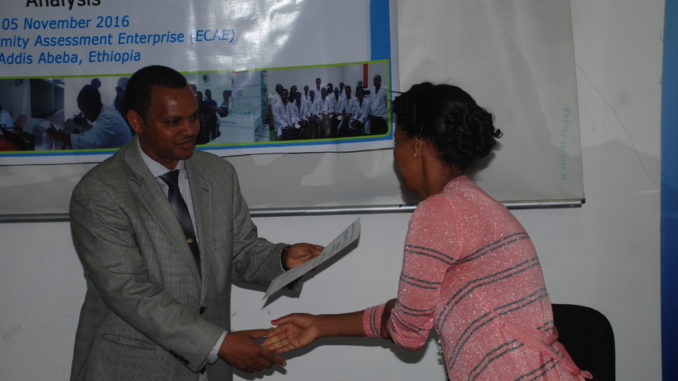
The Netherlands Development Organization (SNV) and Ethiopian Conformity Assessment Enterprise graduated 21 laboratory technicians trained in honey and other agri-food quality testing.
Laboratory technicians from nine laboratories of private sector, universities, research centers and government agri-food laboratories have completed General Principles of Laboratory Analysis and Management, Full honey and Residue analysis modules.
Trainees expressed their readiness to apply the knowledge from the training. Wessenyeleh Ambaw from Ethiopian Food, Medicine and Health Care Administration and Control Authority (EFMHACA) laboratory said that his organization lacked capacity to address safety issues.
EFMHACA as an authority mandated to regulate from production up to consumption of food and food supplements, and ensuring safety and quality of products must address safety issues. “However, due to capacity limitation we were not actively engaged in doing so. From now on, we will begin to address safety issues” added Wessenyeleh.
Despite the plan to deliver quality honey, wax and increase earning from the beekeeping sub-sector in the Second Growth and Transformation Plan (GTP II), capacity was an issue.
The State Minister for EFDR Ministry of Science and Technology, Professor Afework Kasu emphasizing on knowledge transfer, called upon the private sector to enhance its engagement in agri-food quality testing business. He said that the government will provide support to national quality conformity stakeholders to enhance the infrastructure.
“The training will significantly contribute to foreign currency saving from reduction of costs of testing of honey and other bee products; and in creating capacity in agri-food quality testing” said Teshale Belihu, Director General of Ethiopian Conformity Assessment Enterprise.
Since Ethiopia started exporting honey, depending on the size of honey and wax, the country annually expends between 25,000 to 45,000 Euros for collecting, transporting and testing of the sample at international laboratories, mainly in Germany.
SNV in Ethiopia is implementing Apiculture Scaling up Programme for Income and Rural Employment (ASPIRE) Project with the overall goal to contribute to poverty reduction in rural areas of Ethiopia and with specific objective, among others, to make Ethiopia a significant exporter of apiculture products, specifically honey, beeswax, pollen and propolis.
Due to the Business Organizations Access to Markets (BOAM) project of SNV Ethiopia, securing a Third Country Listing Ethiopia started exporting honey to Europe in 2009.
SNV will continue investing on strengthening local capacity; increasing access to appropriate and affordable technologies; connecting smallholder households to the private sector and contribute to ensuring food security for food insecure households.
Embassy of the Kingdom of the Netherlands funds Apiculture Scaling up Program for Income and Rural Employment Project.
Source: The Netherlands Development Organization
——
Other stories:
- Solar Energy System Installation Project Changing Lives: AMU
- A New Cancer Treatment Center to Be Inaugurated at Haramaya University
- Turkish Cooperation and Coordination Agency (TİKA) Donates to Mekelle University Students with Special Needs
